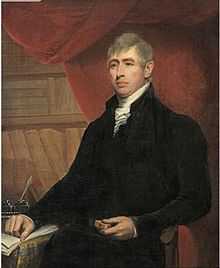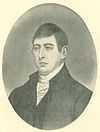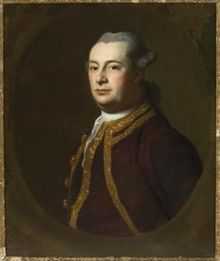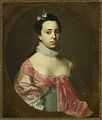Richard John Uniacke
| Richard John Uniacke | |
|---|---|
 Richard John Uniacke by Robert Field | |
| Born |
November 22, 1753 Castletown, Republic of Ireland |
| Died |
October 11, 1830 (aged 76) Mount Uniacke, Nova Scotia |
Richard John Uniacke (November 22, 1753 – October 11, 1830) was a lawyer, politician, member of the Nova Scotia Legislative Assembly and Attorney General of Nova Scotia. He devoted 49 years to public service in Nova Scotia. He supported Jonathan Eddy's Nova Scotia rebels in the American Revolution, was Protestant Ascendancy Irish, a leading member of the "extreme wing" of the Church of England (Anglican), and also a member of the pre-loyalists. All these positions put him in opposition to many political figures, particularly Loyalist, at various times in his life. He is buried in the crypt of St. Paul's Church (Halifax).
Early Years
Born in Castletown, County Cork, Ireland, located just four kilometres from the family estate of Mountuniacke, created by his grandfather, Captain James Uniacke.[1]
The FitzGerald-Uniackes were a long standing landed gentry family which included Mayors of Youghal. The origins of the family name are uncertain but may come from the area named after St. Unicus in Brittany. The family arrived in Ireland during the Norman invasions of the eleventh-century. Another story is that one of the Fitzgeralds took the lead of a successful military attack when no others would do so. Thereafter Fritzgerald was known as "Unicus est" or "the only one".[2][3] The plea-roll records from Bermingham Tower, Dublin Castle, for the 14th century list a series of Uniackes starting with Bernard de Uniak listed as a resident at Cork in 1305.
Richard attended school at Lismore, County Waterford. At the age of sixteen he came under the influence of a Catholic priest and as this was abhorrent to his Protestant family, his father had him sent to Dublin where he was articled with the law firm of Thomas Garde. In Dublin Richard became fascinated with the movement for greater Irish political autonomy and he eventually joined with the Irish nationalists. This caused a rupture in the relationship with his father and being cut off from his allowance. Refusing to return home, Richard being penniless, prematurely abandoned his studies and decided to seek his fortune elsewhere. (In 1777, after living in Nova Scotia he returned to Ireland to complete his legal training. Uniacke was admitted to the Bar in Nova Scotia and appointed solicitor in 1781.) In December 1773 he boarded a ship to the West Indies (where one of his brothers, who had joined the army, was stationed), arriving in St. Kitts in early 1774. In short order, Richard not having found any profitable opportunities for himself, sailed for Philadelphia. There he fell in with Moses Delesdernier who convinced Richard to accompany him to Nova Scotia. By the fall of 1774 Richard was in business with Delesdernier in the upper reaches of the Bay of Fundy at Hillsborough, New Brunswick (prior to partition in 1783, New Brunswick was part of the colony of Nova Scotia). There Uniacke met Delesdernier's twelve year old daughter, who in 1775 he married.[4]
American Revolution

The rising tensions in the thirteen American colonies left many Nova Scotia's colonists, particularly those who had recently emigrated from the New England colonies, in a confused state as to where their loyalty lay. Uniacke's father-in-law was an ardent loyalist and made efforts to keep his brethren in the Chignecto region loyal. Delesdernier was instrumental in having a number of the heads of local families sign documents of loyalty. Uniacke was included amongst the signatories. In order to protect themselves from the rising anger and destruction of local rebels, Delesdernier and Uniacke moved their family to Fort Cumberland. Despite Uniacke's apparent loyalty to the Crown of Britain he was soon among those Nova Scotians, under the leadership of Jonathan Eddy, who wanted to join American patriots against the British in the American Revolution. It is uncertain why Uniacke appears on both sides of the British/American revolutionary fight. It may have been sheer circumstance that pushed Uniacke to be pragmatic taking a role that would best protect his family. Depending on which side won, Uniacke and Delesdernier would be in positions to ameliorate the others disadvantage. Eddy's initial actions in the area amounted to terrorizing the local population who had not thrown their lot in with the rebels and to isolate Fort Cumberland. Uniacke participated in some of these actions and while trying to commandeer supplies heading for the Fort he was captured. Shortly thereafter he was sent a prisoner to Halifax. Due to his capture Uniacke took no part in the subsequent attack by Eddy and his forces on Fort Cumberland. As a rebel Uniacke faced being charged with treason and if found guilty, hung. It is likely due to his family connections, the fact several military officers in Halifax had been stationed with several of his brothers, and the fact he provided evidence for the crown that led to his release. Despite his near escape from the hangman's noose, the continuing stresses in Nova Scotian society brought about by the ongoing American Revolution, made Halifax an uncomfortable place and he decided to return to Ireland to finish his law studies.[5]
Political Life
Uniacke completed his law studies and became a lawyer at King's Inns, Dublin, in 1779.
Although, upon his return to Halifax, Uniacke held the appointment of solicitor general, the position alone would not support him and his growing family. In 1781, Uniacke established a successful law practice which would become the largest in the Province. In 1783 he ran for a seat in the House of Assembly, representing Sackville and was appointed the Clerk of the House when he took up his seat. Uniacke was opposed to the partition of Nova Scotia which generated the creation of New Brunswick. His opposition to the creation of the new colony may have partly been due to the fact he would lose his seat as it would then lay outside the jurisdiction Nova Scotia. In 1784 he acquired the lucrative position of Advocate General of the Vice Admiralty Court of Nova Scotia. Uniacke held investments in privateering ventures so it is not surprisining he was quick to condemn captured ships taken by Nova Scotia privateers. By 1814 he had amassed a £50,000 fortune from his Vice Admiralty fees.[6] In 1785 Uniacke again ran for the House of Assembly, winning his Halifax seat. From this seat, in 1788, he was appointed Speaker of the House. In the election of 1793 Uniacke lost his seat. By the next election (1797), Uniacke stood for a seat in Queens County, which he won and held onto in the election of 1799. Prior to the 1799 election he was named Speaker of the House and reaffirmed in this position after that year's election; a position he held until his resignation in 1805. In 1808 he was appointed to the Council (Just become his death in 1830 he succeeded Blowers to the Presidency of the Council).
The political infighting that accompanied the vying for patronage positions since the arrival of the Loyalists spilled over into outright animosity between opposing participants. Just such a situation arose between Samuel Blowers (appointed attorney general in 1784) and Richard Uniacke. Uniacke, since the time of the Eddy Rebellion, had developed an animosity for the New Englanders, once stating they were " a race of the most lawless profligate and wicked monsters that exist on the face of the earth".[7] In 1791 Uniacke uttered "rude things" to Blowers and as a result Blowers challenged him to a duel.[8] Uniacke was eventually convinced by Justice Strange to apologize for the slight to Blowers' honour, thus avoiding potential bloodshed.[9] In 1798 Blowers again challenged Uniacke to a duel but the situation was defused by the city magistrates.[10] (In 1819, Uniacke's son Richard John Uniacke, Jr. was also in a duel. He killed his opponent. He was tried for murder and acquitted.)
As a strong promoter of his adopted homeland, Uniacke constantly strived to build a strong economy in Nova Scotia. Since the end of the American Revolution, Nova Scotia's trade had suffered major inroads from the merchants in the new United States. Nova Scotia's American competitors were free to attempt to trade where they chose, and had won in the treaty of 1783 access to the rich fishing grounds off Nova Scotia and Newfoundland. Nova Scotia merchants and shipping interests were hampered by the British Navigation Acts that required all foreign trade by the British colonies to enter Britain and pay various duties. In the 1790s Uniacke lobbied the British government to relax or exempt Nova Scotia from the Navigation Acts as well as to open several freeports in the colony. He also supported the lobby to close British Caribbean ports to American trade and shipping. By the early nineteenth century many of these ideas had been implemented and Nova Scotia’s economy had rebounded. The Navigation Acts were completely repealed in 1825.
Attorney General
In 1780 he travelled to England and while there interviewed with George Germain, 1st Viscount Sackville, the Secretary of State for the Colonies, who promised him the position of attorney general in Nova Scotia when it became vacant. The following year Uniacke returned to Halifax. Over a span of sixteen years, Uniacke fought four times to become the Attorney General of Nova Scotia (1787, 1784, 1789, 1797). The attorney general's seat soon became available (1781) but the position was granted to Richard Gibbons by Governor Hamond. Uniacke was given the position of solicitor general. His subsequent efforts in 1784 and 1789 were blocked by Loyalists who dominated the appointments to this position and opposed the appointment of Uniacke, a pre-loyalist. In opposition to the Loyalists, Uniacke championed the rights of the pre-loyalists and New England Planters. In 1797 Loyalist Governor Wentworth recommended another candidate over Uniacke. Both sides marshaled support for their claim. Uniacke primarily appealed to William Cavendish-Bentinck, 3rd Duke of Portland and was successful. Wentworth in fact received severe chastisement from his superior, Portland, that stated "the representation I have received from Mr. Uniacke of his services...would have obliged me to pause had I not received the King's command to express to you his opinion that hardly any consideration whatever ought to supersede such a claim as Mr. Uniacke derives from the length of his service".[11]
In his role as Attorney General, to continue Nova Scotia's economic growth, Uniacke worked to increase the number of immigrants coming to the colony. In part immigration had been hindered by the cancellation of free land grants. In 1806 Uniacke pushed for a renewal of the granting of land to settlers. Furthermore he moved to escheat large tracts of land, from holders whose only intent was to speculate on the lands they held, feeling this had further slowed the influx of new settlers. By 1820 he had escheated 100,000 acres. These lands then became available to the government which allowed them to provide new land grants to the many immigrants that landed in the Province after the Napoleonic wars. From 75,000 people in 1815, Nova Scotia's population reached 200,000 in 1838.[12]
Public Life
From a young age Uniacke held a liberal attitude and a desire to see reform within British society. Upon his arrival in St. Kitts in 1773, he was exposed for the first time to slavery, an institution which he opposed. He could not understand how the institution of slavery could be practiced against a people whose only difference was that God had "made them black instead of white".[13] In Nova Scotia he took up the cause for the abolition of slavery arguing before a court it had no basis in law.
His affinity to Catholics stayed with him throughout his life. He favored the reform of the Penal Laws (Ireland) that so disadvantaged the Catholics and took up the cause of religious reform in Nova Scotia. In 1783 he redrafted a bill passed by the Nova Scotia House of Assembly to repeal the law passed in 1758 that had proscribed Catholics. The bill had been struck down by the British government. Uniacke's redraft was confirmed thus allowing Catholics to own land, build churches and hire priests. In subsequent years Uniacke put forward additional amendments which allowed Catholics to establish schools and to vote in elections. His effects to bring about complete emancipation of Catholics continued until success was achieved in 1829.
In 1786 Uniacke was one of the founding members of the Charitable Irish Society; established to assist needy Irish regardless of whether they were Protestant or Catholic. Earlier, in 1780, he joined the Halifax Masonic Lodge, rising to the position of Worshipable Master in 1792.
Uniacke was also instrumental in the establishment in 1789 of King's College (see also King's Collegiate School) at Windsor, and he sat, despite being a non-Anglican, on its board.
The threat of war and invasion in late eighteenth and early nineteenth-century Nova Scotia, as part of the British Empire, was an every looming specter. To counter the threat the Province maintained a militia. In 1793 Uniacke was second-in-command of the Second Battalion of the militia and in 1794 was promoted to Lieutenant-colonel of the Eighth Battalion.
In 1827 Uniacke took up the position of President of the Halifax Society for the Encouragement of the Fisheries.
Confederation
Uniake was the first public figure to advocate for the Confederation of Canada, 51 years before it became a reality. He was afraid that the revolutionary “heresies” of atheism and democracy spreading to the “hoards of semi-barbarians” in the United States would engulf New England and then British North America. He wanted to save the colonies from republicanism, atheism, and democracy. As a result, Uniacke advocated unions of the Maritime colonies and of the Canadas, beginning in 1806 when he presented a memoir on British North America at the Colonial Office.[14] In 1826 Uniacke brought his “Observations on the British colonies in North America with a proposal for the confederation of the whole under one government” to the Colonial Office. The “Observations” read in parts like the British North America Act of 40 years later.[15]
Family
In 1774 he travelled from Ireland to the West Indies and then arrived in Philadelphia. In Philadelphia, he was recruited by Moses Delesdernier to settle the Hopewell Township in Nova Scotia (present-day Hopewell Cape, New Brunswick). The following spring both moved to Hopewell. On May 3, 1775 Uniake married Delesderneir's daughter Martha Maria, then aged 12. They would have eleven children before her death in 1803.[16] In 1808 he married Eliza Newton, who bore him a son in 1809.[17]
His son James Boyle Uniacke was a lawyer and the first Premier of Nova Scotia. Another son, Richard John Uniacke, Jr. was a lawyer, Attorney General of the colony of Cape Breton, judge, and political figure who represented Cape Breton County (after Cape Breton was re-incorporated into Nova Scotia) in the Nova Scotia House of Assembly from 1820 to 1830. His son Norman Fitzgerald Uniacke studied law in Nova Scotia and in 1798 furthered his law studies in London, entering the law at Lincoln's Inn; the second Nova Scotian to do so. In 1808 he was appointed the Attorney General of Lower Canada, was elevated to the Lower Canada Bench in 1825, and served in the Legislative Assembly of Lower Canada, in later years he joined Nova Scotia's Legislative Council. Norman, as well as his father, were sympathetic to the French Canadians, and from his position on the Bench shielded the captive rebels of the Lower Canada Rebellion from the full brunt of the "bloodhounds of prosecution".[18] His youngest son Andrew practiced law in the family firm. Crofton Uniacke practiced law in the family firm, in 1808 was appointed Receiver of Quit Rents, and in 1817 assumed the judgeship of the retiring Justice Croke, only to resign the position in 1819 when he moved to England where he practiced law. Uniacke's son Robert Fitzgerald, did not follow his brothers into the law; instead, with his father's blessing, he took a path into the church, becoming minister at St. George's Church, Halifax.
Uniacke Estate Museum

His substantial estate (c. 1813) is preserved as the Uniacke Estate Museum Park at Mount Uniacke.[19]
Visitors can also see portraits which belonged in the Uniacke family by the leading American artists of the era:
-
Susannah (Boutineau) Franklin (1762) by John Singleton Copley (wife of Michael Franklin; grandchild of Peter Faneuil)
-
Susannah Boutineau by Robert Feke (1748), (mother-in-law of Michael Franklin)
-

Alicia Uniacke (daughter of Richard John Uniacke) by Robert Field (painter)
-

Richard John Uniacke, Jr. (son of Richard John Uniacke) by Robert Field (painter)
- The portraits of the Francklins accompanied the newlywed couple to Nova Scotia in 1762 and remained in the province until 1927. Michael's portrait was purchased for the Nova Scotia Museum collection in 1982. The two portraits were reunited at Uniacke House after the acquisition of Susanna's portrait in 2004.
- James Boutineau by Robert Feke (1748), (father-in-law of Michael Franklin)
References
Endnotes
- ↑ Brian Cuthbertson. The Old Attorney General: A Biography of Richard John Uniacke 175-1830. Nimbus Publishing Limited, Halifax, 1980. p. 2.
- ↑ Ibid. Brian Cuthbertson. p. 2.
- ↑ Ancestry.com. http://freepages.genealogy.rootsweb.ancestry.com/~shanahan/burkes1863uniacke.html
- ↑ Ibid. Brian Cuthbertson. p. 3-5.
- ↑ Ibid. Brian Cuthbertson. p. 7-11.
- ↑ Ibid. Brian Cuthbertson. p. 62.
- ↑ Ibid. Brian Cuthbertson. p. 10.
- ↑ Ibid. Brian Cuthbertson. p. 26.
- ↑ Canadian Biography Online
- ↑ Ibid. Brian Cuthbertson. p. 36.
- ↑ Ibid. Brian Cuthbertson. p. 35.
- ↑ Ibid. Brian Cuthbertson. p. 70-71.
- ↑ Ibid. Biran Cuhbertson. p. 4.
- ↑ Canadian Biography Online
- ↑ Canadian Biography Online
- ↑ Ibid. Brian Cuthbertson. p. 44.
- ↑ Ibid. Brian Cuthbertson. p. 50.
- ↑ Ibid. Brian Cuthbertson. p. 110.
- ↑ The Canadian Encyclopedia
Texts
- Brian Cuthbertson, The Old Attorney General: A Biography of Richard John Uniacke, Halifax: Nimbus, 1980.
External links
- Uniake Estate Museum Park
- Uniacke - Bluepete
- Biography at the Dictionary of Canadian Biography Online
- Moses Delesdernier
|


